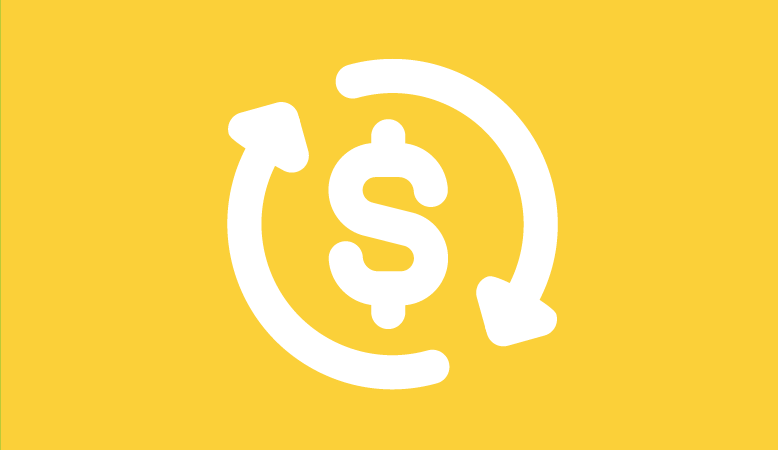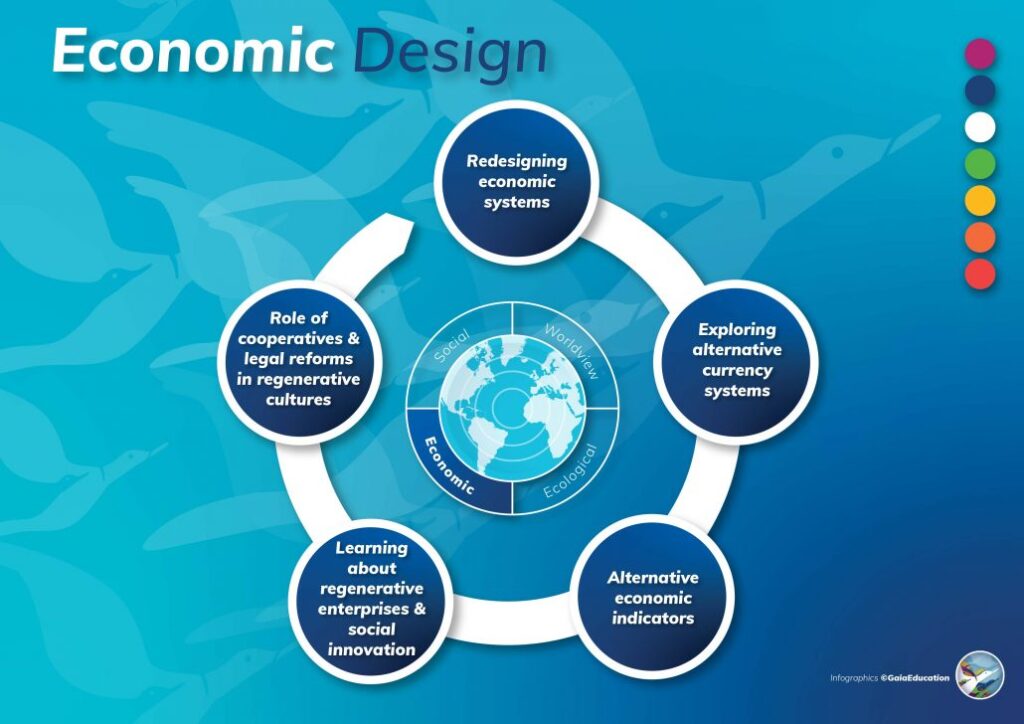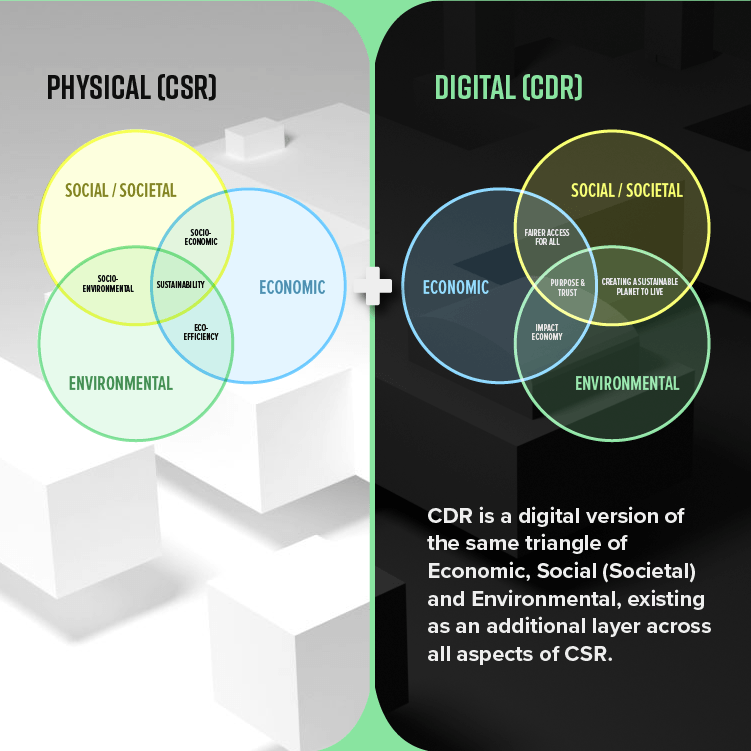Advancing Economic Digital Responsibility

In this post, we explore how economic digital responsibility impacts technology-related financial decisions, including potential problems and solutions you can use in your own organization.
Technology is driving global economic change on a scale the likes of which we’ve not seen before—the 4th Industrial Revolution, according to some. 3D-printed schools, climbing robots, sensor-powered agriculture, and other emerging technologies redesign the very fabric of society. New breakthroughs happen every day while more established digital disciplines—like marketing and product design—continue to evolve at breakneck speed, especially with new developments in artificial intelligence.
According to the U.N. Trade & Development’s 2024 Digital Economy Report, the digital economy is booming:
- Annual smartphone shipments have more than doubled since 2010, hitting 1.2 billion in 2023.
- Internet of things (IoT) devices are projected to surge 2.5 times from 2023 to 39 billion by 2029.
- New data from 43 countries, representing about three quarters of global GDP, show business e-commerce sales grew nearly 60% from 2016 to 2022, to reach $27 trillion.
However, with rapid growth comes rebound effects and a slew of Big, Wicked problems as well. From unintended social and environmental consequences to tools implicitly designed for deception, economic progress has come at great cost to some while leaving others behind entirely.
Given this, is there a set of ethical, responsible, and more sustainable economic principles that can govern our entire digital economy—from the smallest agencies to Big Tech companies noted above, including organizations just getting started with digital transformation?

Designing A New Economic System
The Fourth Industrial Revolution is about more than just technology-driven change; it is an opportunity to help everyone, including leaders, policy-makers and people from all income groups and nations, to harness converging technologies in order to create an inclusive, human-centred future. The real opportunity is to look beyond technology, and find ways to give the greatest number of people the ability to positively impact their families, organisations and communities.
— World Economic Forum
I was recently privileged to co-facilitate the Economic Design course of Gaia Education’s Design for Sustainability program, which focuses on designing regenerative cultures. The course explores alternative currency systems and economic indicators, social innovation, cooperatives, alternative legal structures (like benefit corporations), and other important practices necessary to redesign our economic systems so that they work better for everyone. This is mission-critical work.
Since 2011, Mightybytes has been part of the global B Corp community. Our collective mission is to build a regenerative, equitable, and more inclusive economy that works for everyone. As a digital agency, we are committed to using design and technology to create a better world. Therefore, focusing on this work—and helping our clients do the same—is core to how we execute our mission.
With technology playing such a key role in this long overdue economic transition, responsible digital practices must live at the heart.

Defining Economic Digital Responsibility
One conclusion from the 100+ social and environmental mission companies I have interviewed is that focusing on sustainability and being responsible leads to more effective business operations overall and as a result better financial performance.
— Christopher Marquis, Better Business: How the B Corp Movement is Remaking Capitalism
Economic digital responsibility, one of several categories of corporate digital responsibility, concerns itself with the financial and economic impacts of an organization’s technology decisions. Since economic digital responsibility is directly related to how organizations make money and share in the benefits of digital products and services (or not), it arguably offers the biggest potential to close income inequality gaps, address systemic racism, and build an economy that works for everyone. It inspires many questions for conscientious leaders looking to make informed and economically sound decisions. For example:
- Will the people you employ or contract for digital projects be fairly compensated?
- Are there other unintended financial consequences that could arise from your technology choices?
- Have you explored opportunities to more equitably share the economic opportunities that arise from digital products or services?
- In the race to adopt emerging technologies, who is being financially neglected?
- Are there opportunities to create new digital-native positions within organizations that are economically feasible as well as rewarding and engaging?
Answers to these questions sit at the heart of economic digital responsibility. Here are some things you can do.
Ubiquitous JEDI Practices
First and foremost, all this work must be grounded in justice, equity, diversity, and inclusion (JEDI). Both the tech and sustainable business communities are predominantly White and majority male. This must change if we’re truly going to make a difference. So many of the practices described below won’t reach their true potential if people from underrepresented or otherwise marginalized communities are not active participants.
This includes hiring practices, but also the businesses you support too. For example, during the COVID-19 pandemic, 41% of Black-owned businesses closed their doors compared to 17% of White-owned businesses.
A broader, more diverse set of stakeholders always contributes to better solutions. Likewise, a company that supports more diverse organizations will be a better business. For everything you do, take a step back, reflect, and ask yourself: who is being left out?
Invest Responsibly in Digital Products and Services
We see it all the time: organizations cut corners on technology investments to get results faster. Suddenly a prototype, which was never meant to be a final product, goes live. A complex digital product becomes a slapdash conflagration of plugins and APIs, loosely bound together with the virtual equivalent of dental floss and chewing gum.
This leads to security risks, privacy breaches, user frustration, increased churn rates, and technical debt—the accumulation over time of code that needs refactoring to ensure long-term viability. All these things have measurable economic impacts.
While this happens in the private sector, it runs rampant in nonprofit and civic projects due to lack of resources and, specifically, how projects are funded. Also, digital agencies are notorious for underbidding projects in order to win the work. Once this occurs, they must scramble to deliver something passable on time and under budget. Often, these deliverables are subpar because the project wasn’t appropriately funded or given a realistic timeline. This is an all too frequent side effect of the broken RFP process.
A mindset shift for your next digital product could increase your chances for collective economic success:
- Think product, not project: Good product management practices, like effective prioritization and user research for instance, will help you make measurable progress toward your goals. This can drive more responsible financial decisions over time.
- Budget for outcomes, not outputs: Earmark funds annually, or better yet, quarterly for digital work and ditch the project budgets. Outputs are easy to quantify, but will they help you actually reach your goals? Outcomes—like a significant change in user behavior, for example—are much more desirable…but also harder to shoehorn into a finite project budget.
- Map your stakeholder ecosystem: Stakeholder mapping can reduce your chances for unintended consequences and help you more broadly understand who (or what) might be affected by your product or service. This could directly impact financial decisions.
- Agility and continuous improvement: Similar to the first two points above, test-driven methods to measure success and drive continuous improvement are more economically sound. Embrace failure as a learning opportunity—it will save you time and money in the long run.
The other side of this coin is that increased capital must be made available to projects with both financial and social or environmental value at their core. Impact investing must become the norm as opposed to the outlier, but that’s a different post for another time.
Living Wages, Improved Benefits
Tech accountability” is currently a popular call — whether it be from government, civil society, media, or inside the industry itself — but what does it mean if related efforts are not centered on the rights and protections of those workers within the tech industry? Real reform will only come from the combined efforts of workers, external advocates, and regulators. For workers to be able to disclose information that can be used to demand and ensure accountability, there must be a basic level of safety in place, and there’s nothing more basic than access to physical and mental health care.
— Ifeoma Ozoma, Employer-Tied Healthcare is Also a Tech Accountability Issue
At Mightybytes, we guarantee everyone who works for the company—employees and contractors—is paid the equivalent of a living wage. We also strive to maintain a small compensation ratio of lowest-to-highest paid employees.
In addition to paying a living wage, we also strive to offer the best benefits our resources will allow. These range from ‘standard’ benefits like health insurance and retirement savings to more intangible benefits like flex time, predictable hours, and so on.
However, tying healthcare benefits to employment can trap people in positions that may not be a good fit for a variety of reasons. This approach may require companies in some industries to rethink their balance sheets and, in some cases, their business models. The research exists: a living wage and access to good benefits improves both the economy and quality-of-life. Let’s prioritize this for digital positions and across society at large.

Outsource Responsibly
Uber set out to build a tool that democratized access to cars. It ended up building a tool that further impoverished the poor. The service model was fine, but the financial model it used for growth could only ever be as ethical as the people who strove to benefit the most…Silicon Valley has exhibited total comfort with destroying the social fabric of humanity to make a profit.
— Mike Monteiro, Ruined by Design
If you’re using external vendors, audit their practices to ensure workers have fair wages, work-life balance, and good benefits. It might be tempting to accept that offshore offer for low-cost programming services, but does it also support worker exploitation? Find out before making a decision.
In digital, low gig economy wages have advanced income inequality while also reducing the quality of digital solutions. Gig economy platforms have long been criticized for short-changing the people who use their platforms to generate income.
Also, while these contracts provide flexibility, they don’t come with paid sick leave, parental leave, vacation days, healthcare benefits, workers’ compensation, or any number of benefits that contribute to an overall social safety net.
More importantly, gig jobs don’t offer protection from discrimination. Since there’s also no means for collective bargaining, gig workers are vulnerable to wage or hour violations. The artificial intelligence industry, for example, outsources data labeling tasks, sometimes for as little as $8 per day. We can do better.
Replace Human Jobs Responsibly
Digital technology changes quickly. When positions are eliminated or merged, or new technologies introduced, cross-train interested employees in additional skills related to the company’s products and services so as not to disrupt employment.
Sharing Economic Benefits
If the global cooperative economy were a single economic unit, its $20 trillion combined asset base would make it the fifth largest economy in the world. That’s all to say that cooperatives are far more common, and more economically significant, than you might think.
— Cameron Madill, Five Reasons Our B Corp Became a Worker Cooperative
In 2020, Cameron Madill transitioned his agency PixelSpoke from a single-member LLC to a worker-owned cooperative, citing five primary reasons:
- Living his beliefs: Cooperatives are a tool for teaching democracy through doing.
- Reducing inequality: Co-ops offer paths to ownership that might otherwise be out of reach for some.
- Increasing employee engagement: The cooperative structure offers opportunities to improve stability, productivity, and growth potential.
- Ensuring long-term sustainability: Sharing ownership allows co-ops to create more robust leadership structures focused on long-term viability.
- Stimulating change: Shared ownership can reduce stagnation and help organizations prioritize continuous improvement.
While transitioning to a worker-owned cooperative may not be an option for every organization, there are other ways that conscientious leaders can commit to sharing the economic benefits of their digital work with stakeholders as well.
For example, digital-native companies—like agencies, software startups, and so on—might offer profit-sharing programs, free or low-cost educational events, free or reduced-fee accounts, or other philanthropic initiatives. Mightybytes, for example, is a 1% for the Planet member, which means we earmark 1% of our topline sales (not profits) for environmental charities each year. We also provide free educational events and audit financial performance annually to prioritize team bonuses.
Shared value isn’t always financial in nature either. You might also consider contributing to an open source project. If you create photos, videos, or other forms of digital content, release them under a Creative Commons license. Consider the forms of capital your company offers and brainstorm ways to share in their benefits.
Respect Data Ownership Rights
Respecting data privacy and ownership takes many forms, from combating software piracy to appropriate image licensing and legal contracts for digital projects. Each of these things have financial and, in some cases, legal ramifications. While we’re not providing legal advice here, there are some things your organization can consider:
- Implement policies to ensure appropriate licensing and attribution are always used in digital projects or content.
- Give people the right to be forgotten. New privacy laws like GDPR or CCPA dictate that if a customer requests deletion from your marketing database, you must comply.
- Similarly, respect consent. Those same laws mentioned above might make it illegal for you to set a cookie in a user’s browser, for instance.
How AI Impacts Economic Digital Responsibility
Scientists, researchers, public opinion, and policymakers agree that with these new technological advancements comes a degree of responsibility to make sure that the next generations will live in a safe, trustworthy, and inclusive digital environment. Often, innovation comes with a price, and it is our collective responsibility to focus on future digital technologies in terms of responsible design thinking and development, and how such technologies are sustainable and used to avoid unintended consequences.
— IEEE, Corporate Digital Responsibility: Securing Our Digital Futures
Finally, we cannot cover economic digital responsibility without mentioning the emerging impacts artificial intelligence creates. Generative AI creates new industries while laying waste to others. In the process, businesses close and people lose their ability to thrive.
We need to ask ourselves important questions related to this:
- Who has access to tools and data being used to drive economic change within our organizations?
- Who benefits from the outcomes of this economic change?
- Is decision-making equitably distributed when new products, services, policies, and programs are introduced within an organization?
- Are organizational stakeholder perspectives represented throughout the lifecycle of these products and services?
- Are employees offered opportunities to learn new skills in the face of technological disruption?
If we truly want to create an economy that works for everyone, technological disruptions must be managed more ethically and sustainably with organizational stakeholders centered in processes and decision-making.
Economic Digital Responsibility: Last Word
There is a greater percentage of people living in poverty now than in 1969 and their degree of poverty is more severe, on the order of third world countries. Families living on $2 a day. People should not be living like that in America or anywhere, for that matter. . . Inequality of wealth is now greater than at any time in history because modern technology allows the purchase of so much more personal power and influence at a relatively small price. Don’t get excited, it’s still more than you or I can afford.
— Glen Hendrix, Economists Have Been Lying to Us for Decades
This was definitely the toughest post in our corporate digital responsibility series to write so far. It’s such a huge topic that impacts so many different types of organizations across sectors, industries, and of varying sizes. To distill all this information down into a single post outlining the high-level concepts of economic digital responsibility is no small feat.
With that said, economic reform and sustainable digital transformation must occur in tandem for society to thrive in the 21st century and beyond. Organizations need to start thinking in systems and planning for long-term resiliency as quickly as possible.
Plus, in order for a stakeholder-driven economy to drive long-term progress, systemic change must occur. This doesn’t happen without improving standards, creating industry guidelines, and enacting new legislation. Every responsible digital company must also become an advocacy engine. The Responsible Tech Advocacy Toolkit below can help.
Hopefully, the topics covered herein offer a stepping stone to jumpstart your own efforts. As always, if you want to discuss anything in this post, feel free to contact us or message me directly on LinkedIn.
Responsible Tech Advocacy Toolkit
Advocate for responsible tech policies that support stakeholders with this resource from the U.S.-Canada B Corp Marketers Network.
Get the Toolkit


